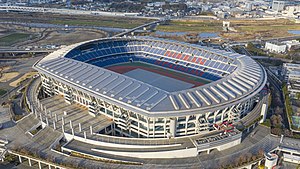Nissan Stadium
| Nissan Stadium | |
|---|---|

|
|
| The Nissan Stadium in Yokohama | |
| Earlier names | |
|
Yokohama International Stadium |
|
| Data | |
| place | 3302-5 Kozukue Kōhoku-ku , Yokohama , Japan |
| Coordinates | 35 ° 30 '36 " N , 139 ° 36' 23" E |
| owner | Yokohama City |
| operator | Yokohama Sports Association Yokohama F. Marinos |
| start of building | January 1994 |
| opening | March 1, 1998 |
| surface | Natural grass |
| costs | ¥ 60.3 billion (approx. € 436 million ) |
| architect | Matsuda-Hirata / Tohata Architecture Office ( Joint Venture ) |
| capacity | 72,327 seats |
| playing area | 107 m × 72 m |
| Societies) | |
| Events | |
|
|
The Nissan Stadium ( Japanese 日 産 ス タ ジ ア ム , Nissan Sutajiamu ; International Stadium Yokohama ), named after the sponsor Nissan of the same name , is a football and rugby stadium with an athletics facility in the Kōhoku-ku district of the Japanese city of Yokohama . It is the home ground of the soccer club Yokohama F. Marinos from the J. League Division 1 .
history
Planning for the stadium construction began in the early 1990s. Construction began in January 1994 and was completed in October 1997. The sports facility, which opened on March 1, 1998, has 72,327 seats, 34,371 of which are on the lower tier and 37,956 on the upper tier. It is currently the largest stadium in the country. The 60.3 billion yen complex is used next to soccer and the like. a. used for athletics , rugby , American football, and cultural and entertainment events. The roof structure covers three quarters of the seats. The playing field made of natural grass is surrounded by a nine-lane Class 1 certified athletics facility, which is suitable for international championships. The press stand offers 288 seats in the main stand.
A video wall measuring 19 m × 9 m is installed under the roof in the rear gate areas . The floodlight system with 824 spotlights provides an illuminance of 1,500 to 2,000 lux . There are 147 handicapped-accessible spaces in the stands. If necessary, 485 additional places can be converted. A total of 528 loudspeakers for the public address system are distributed throughout the stadium . There are 378 toilets for men and 406 for women at 50 locations in the stadium. The main stand has a roof section that can be extended by 5.5 meters and is 146 meters long to protect the press stand and the VIP seats. The press conference room has 350 seats. Rainwater collected on the roof is used to irrigate the pitch. In addition, industrial water is used for flushing toilets and for watering plants and green spaces.
The facility was one of ten Japanese stadiums at the 2002 World Cup in Japan and South Korea. In addition to three group matches, the final between Germany and Brazil (0: 2) was played in the Yokohama International Stadium on June 30, 2002 . The year before, the 2001 FIFA Confederations Cup was held as a dress rehearsal in the Yokohama stadium. From 2002 to 2004, the Yokohama Stadium hosted the World Cup . In addition, games, including all finals of the FIFA Club World Cup 2005 , 2006 , 2007 , 2008 , 2011 , 2012 , 2015 and 2016, were held in the Nissan Stadium - in accordance with FIFA regulations during the competitions out of consideration for the official FIFA Sponsors again carried the old advertising-free name - carried out. The stadium next to the Nagai Stadium in Osaka was also chosen as the venue for the 2015 FIFA Club World Cup . As the International Stadium Yokohama ( Yokohama International Stadium), the stadium was, among other things, the final venue of the Rugby Union World Cup 2019 . Nissan Stadium is slated to host the 2020 Summer Olympics soccer tournament outside of Tokyo .
See also
Web links
- Official website , nissan-stadium.jp (Japanese, English)
- International Stadium Yokohama, Yokohama , www.fifa.com
- Nissan Stadium (Yokohama International Stadium) , stadiumdb.com (English)
- Picture gallery , stadionwelt.de
Individual evidence
- ↑ Overview of the Facility , nissan-stadium.jp (English)
- ↑ Osaka to debut as a FIFA Club World Cup venue , fifa.com from May 22, 2015 (English)
- ↑ Venue Plan , tokyo2020.jp (English)

